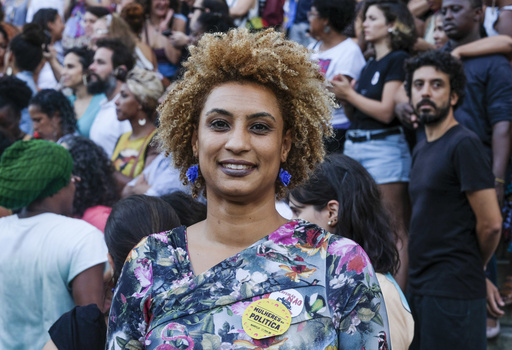
The trial concerning the alleged assassins of a city councilwoman in Rio de Janeiro is set to commence, a case that has captured the attention of Brazil and beyond.
Beginning Wednesday, demonstrators have gathered outside the courthouse in the heart of Rio, where two ex-police officers will face justice for the murders of Marielle Franco, a councilwoman aged 38, and her driver, Anderson Gomes, who lost their lives on March 14, 2018. Ronnie Lessa is charged with pulling the trigger in a drive-by shooting, while Élcio Queiroz is believed to have been the driver involved in the pursuit.
Both men have been in custody since their arrest in 2019 and are now awaiting the trial’s outcome. They previously struck plea deals admitting their involvement in the crime; however, it is ultimately the jury’s decision that will determine their guilt or innocence.
Marielle Franco was a prominent figure as one of the few Black women in Rio’s city council, identifying as bisexual and raised within the impoverished communities known as favelas.
In a statement preceding the trial, the Marielle Franco Institute, established by her relatives after her tragic death, declared, “We have been anticipating this moment for six years.” They emphasized that this is a crucial point for everyone advocating for justice and for a Brazil that protects its vulnerable communities, including women, the LGBTQ+ community, and favela residents.
While jurors possess the technical ability to reject the plea agreements made with Lessa and Queiroz, experts believe it is unlikely they will do so.
The trial will also address the attempted murder of Franco’s assistant, Fernanda Chaves, who was hurt in the attack but survived, and she is expected to provide crucial testimony in the coming days. Prosecutors are aiming for the harshest penalties for the two defendants, seeking sentences that could reach up to 84 years each for the homicides, as stated by the public prosecutors’ office of Rio.
Franco’s assassination, being an attack on a democratic elected official, was particularly significant given her background and relentless advocacy for the marginalized people of Rio. After her election in 2016, she tirelessly campaigned against violence directed at women and worked to defend human rights and social initiatives. Despite facing pushback, Franco’s assertiveness and visibility remained strong.
The public outcry following her murder incited widespread demonstrative movements, leading many to view Franco as a symbol of leftist resistance. Her image has appeared on various forms of media across the country, while citizens continue to demand justice for both her killers and those who orchestrated the deadly attack.
In September, Edilson Barbosa dos Santos was convicted for handling the vehicle used in the shooting, but many believe the current trial represents the first chance to hold key individuals accountable for her murder.
The trial will be conducted via videoconference, with both defendants participating from their respective detention centers—Lessa is located in Sao Paulo, while Queiroz is in Brasilia. Throughout the proceedings, the jury will hear from nine witnesses, including seven presented by the state’s prosecutors and two from Lessa’s defense team. Queiroz’s legal representatives did not choose to call any witnesses.
Throughout the investigation, critical unresolved questions have remained: Who orchestrated Marielle’s assassination, and what were the motivations behind it? These queries have sparked a call for justice.
Investigations took a notable turn when leftist President Luiz Inácio Lula da Silva assumed office in 2023, following the unsuccessful reelection campaign of far-right President Jair Bolsonaro.
In March, federal authorities apprehended federal lawmaker Chiquinho Brazão and his brother Domingos Brazão, who serves on Rio’s state financial watchdog, on suspicions of being behind Franco’s murder. They are purportedly linked to militia groups that illegally charge community members for services, including extortion. Both have denied any involvement in her death or connections to such criminal organizations.
In his plea deal, Lessa indicated that the Brazão brothers were the ones who hired him, asserting that the head of the state’s civil police, Rivaldo Barbosa, had granted approval beforehand. Barbosa was also detained in March. Authorities suspect that the politicians may have ordered the attack due to Franco being an obstacle to the militias’ activities. The judicial proceedings related to the alleged masterminds are currently ongoing in the Supreme Court.
